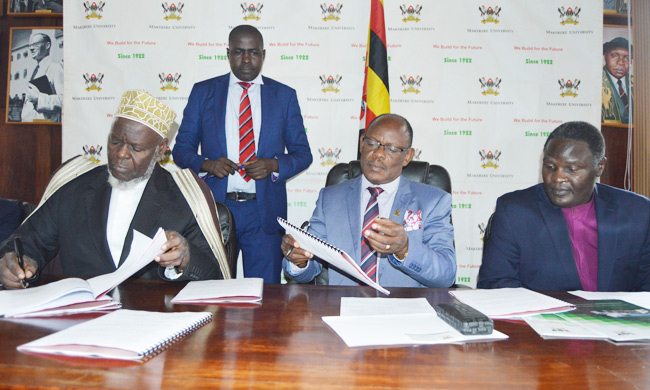On 16th May 2018, the Africa Institute for Strategic Animal Resource Services (AFRISA) under Makerere University College of Veterinary Medicine, Animal Resources and Bio-Security, (CoVAB) together with the Inter-Religious Council of Uganda (IRCU) signed a Memorandum of understanding (MoU) to strengthen religious leaders’ engagements with their congregations in activities that are geared towards community transformation and national development.
The MoU was signed by Prof Barnarbas Nawangwe, the Vice Chancellor of Makerere University on behalf of AFRISA and H.E Sheikh Shaban Ramadhan Mubajje, the Grand Mufti of Uganda and Chairperson, Council of Presidents- IRCU on behalf of IRCU. It initiated a vibrant partnership between the two institutions to implement the Household Economic Transformation Initiative (HETI), a vehicle through which religious leaders will mobilize, skill, encourage and mentor their congregations on how they can effectively address the challenges of food and income security at household level.
The MoU also stipulates the cordial working relationship between the two institutions for a wholistic human development, focusing on the area of livestock value chain development in order to stimulate growth and contribute to community transformation.
The objectives of the MoU are:
- To establish and develop a sustainable Faith Communities-Public-Private-Partnership platform model for transformative skills, technology, and innovation and business development.
- To develop, through faith leaders and their structures, a mentoring system (model) for youths, women and men groups, associations and cooperatives engaged in various agricultural value chains.
- To strengthen faith advocacy strategy for profitable, safe and sustainable agricultural production systems, policies and laws, for the common good of Uganda.
- To work together in establishing and promoting a wholistic transformative training model that promotes transfer of superior of skills, innovation, integrity and technology for agricultural and animal production, value addition and business development in communities.
- To establish and develop an efficient and a sustainable fast tracking mechanism for mass training of clergy and households as the next generation of skilled commercial agricultural and livestock producers, processors and entrepreneurs along the diverse animal resource value chains.

In a speech, His Eminence Sheikh Shaban Ramadhan Mubajje acknowledged the partnership between Makerere University and the Inter-Religious Council of Uganda. He recognised the importance of the Household Economic Transformation Initiative, saying that the innovation has potential of lifting a critical mass of Ugandans at the grassroots out of poverty. “HETI will also empower members of our congregations to actively engage in production, agribusiness and wealth creation”. Our hope is to make agriculture an employment of choice for Ugandans, particularly the young generation searching for better livelihood”, he said.
He appreciated Makerere University and AFRISA for coming up with programmes that are practically addressing people’s needs “It is on this ground that the Inter-Religious Council of Uganda found it essential to partner with you. I pray that the dreams and aspirations of this partnership will be realised for the economic freedom of Ugandans now and the years to come,” he said.
“As religious leaders, while we are proud of our ability to mobilise Ugandans and keep them engaged over a long period through our structures, we do understand that we are not fully equipped with the requisite skills or resources to effectively undertake this initiative. We have therefore cited Makerere University as the potential partner,” said Bishop Joshua Lwere, General Overseer of the National Fellowship of Born again Pentecostal Churches of Uganda.
The Vice Chancellor of Makerere University Prof. Barnabas Nawangwe, welcomed the Chairperson, Council of Presidents- IRCU, the Grand Mufti of Uganda H.E Sheikh Shaban Ramadhan Mubajje, Members of IRCU and esteemed religious leaders to Makerere University and he appreciated their interest in partnering with the institution to transform societies.
“We consider this MoU so important because it directly impacts people in communities. I am confident that we will succeed. Makerere University is the incubation centre of knowledge for the black people, it is Africa‘s research hub and recognised as the top black university in the whole world. With the IRCU, it is the beginning of changing lives in the country,” he stated.
The Vice Chancellor thanked religious leaders for the guidance and leadership that has enabled the country to live in peace and harmony. He thanked Prof. Kabasa and the team, for the vision to transform communities using the university’s knowledge and experience.
According to the Principal of the College of Veterinary Medicine, Animal Resources and Bio-Security-Makerere University (CoVAB) who doubles as the Principal Investigator of AFRISA, Prof. John David Kabasa, the Household Economic Transformation Initiative (HETI) is a mobile training unit that is ready to take Makerere University to the community.
“It will enable the institution to provide the missing link between traditional and Morden ways of attaining skills. With HETI, the university is able to interact with the community in a formal setting with trainers and organised classes where knowledge is perforated to community members,” he said.
The meeting was also graced by Msgr. Charles Kasibante, the Vicar General of Kampala Archdiocese, Bishop Beston Herbert Buyondo, members from Uganda Episcopal Conference, the Secretary General of the Uganda Muslim Supreme Council, members from the Born Again Faith in Uganda, representatives from Seventh Day Adventist Uganda Union, representatives from Church of Uganda, representatives from Uganda Orthodox Church, representatives from Uganda Muslim Supreme Council, representatives from the catholic church, representatives from the Inter-Religious Council of Uganda, Makerere University Central Management committee members, Members of Africa Institute for Strategic Animal Resource Services and IRCU Secretariat members.
Article by: Proscovia Nabatte and Pauline Angom, Public Relations Office


 General2 weeks ago
General2 weeks ago
 Natural Sciences2 weeks ago
Natural Sciences2 weeks ago
 Agriculture & Environment1 week ago
Agriculture & Environment1 week ago
 Health2 weeks ago
Health2 weeks ago
 General5 days ago
General5 days ago



